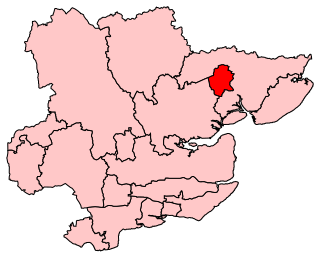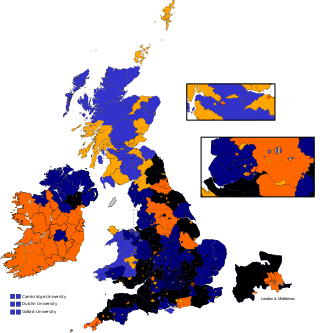
Colchester is a constituency in Essex represented in the House of Commons of the UK Parliament since 2015 by Will Quince, a Conservative. In June 2023 Quince announced that he would not be standing for re-election.

Harwich was a parliamentary constituency represented in the House of Commons of the Parliament of the United Kingdom until its abolition for the 2010 general election.
Warwick was a parliamentary borough consisting of the town of Warwick, within the larger Warwickshire constituency of England. It returned two Members of Parliament (MPs) to the House of Commons of England from 1295 to 1707, to the House of Commons of Great Britain from 1707 to 1800, and then to the House of Commons of the Parliament of the United Kingdom until 1885.
Oxford was a parliamentary constituency in the United Kingdom, comprising the city of Oxford in the county of Oxfordshire.

Lancaster was a constituency of the House of Commons of the Parliament of England then of the Parliament of Great Britain from 1707 to 1800 and of the Parliament of the United Kingdom from 1801 to 1867, centred on the historic city of Lancaster in north-west England. It was represented by two Members of Parliament until the constituency was disenfranchised for corruption in 1867.
Galway Borough was a United Kingdom Parliament constituency in Ireland. It returned one MP from 1801 to 1832, two MPs from 1832 to 1885 and one MP from 1885 to 1918. It was an original constituency represented in Parliament when the Union of Great Britain and Ireland took effect on 1 January 1801.
Montgomery was a constituency in the House of Commons of England and later in the House of Commons of the Parliament of the United Kingdom. It elected one Member, but was abolished in 1918.

Westminster was a parliamentary constituency in the Parliament of England to 1707, the Parliament of Great Britain 1707–1800 and the Parliament of the United Kingdom from 1801. It returned two members to 1885 and one thereafter.

Clitheroe was a parliamentary constituency in Lancashire.
Rye was a parliamentary constituency centred on the town of Rye in East Sussex. It returned two Members of Parliament to the House of Commons of the Parliament of the United Kingdom until its representation was halved under the Reform Act 1832.

Barnstaple was a constituency centred on the town of Barnstaple in Devon, in the South West of England. It returned two Members of Parliament to the House of Commons of the Parliament of the United Kingdom until 1885, thereafter, one.
Southampton was a parliamentary constituency which was represented in the British House of Commons. Centred on the town of Southampton, it returned two members of parliament (MPs) from 1295 until it was abolished for the 1950 general election.
Cricklade was a parliamentary constituency named after the town of Cricklade in Wiltshire.
Evesham was a parliamentary constituency in Worcestershire which was represented in the British House of Commons. Originally a parliamentary borough consisting of the town of Evesham, it was first represented in 1295. After this its franchise lapsed for several centuries, but it then returned two Members of Parliament (MPs) from 1604 until 1868, when its representation was reduced to one member under the Representation of the People Act 1867.
Kingston upon Hull, often simply referred to as Hull, was a parliamentary constituency in Yorkshire, electing two members of parliament to the House of Commons of the Parliament of the United Kingdom, from 1305 until 1885. Its MPs included the anti-slavery campaigner, William Wilberforce, and the poet Andrew Marvell.
Launceston, also known at some periods as Dunheved, was a parliamentary constituency in Cornwall which returned two Members of Parliament to the British House of Commons from 1295 until 1832, and one member from 1832 until 1918. It was a parliamentary borough until 1885, and a county constituency thereafter.
Boston was a parliamentary borough in Lincolnshire, which elected two Members of Parliament (MPs) to the House of Commons from 1547 until 1885, and then one member from 1885 until 1918, when the constituency was abolished.
Leicester was a parliamentary borough in Leicestershire, which elected two members of parliament (MPs) to the House of Commons from 1295 until 1918, when it was split into three single-member divisions.

North Nottinghamshire, formally the "Northern Division of Nottinghamshire" was a county constituency represented in the House of Commons of the Parliament of the United Kingdom. It elected two Members of Parliament (MPs) by the block vote system of election.
Sandwich was a parliamentary constituency in Kent, which elected two Members of Parliament (MPs) to the House of Commons from 1366 until 1885, when it was disfranchised for corruption.







